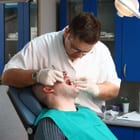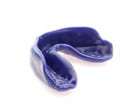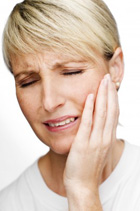 If you are one of these people in the city of Leeds that live alone and suffer from stress or anger problems, there’s a very good chance you may grind your teeth (more commonly known as Bruxism), and you may also be completely unaware of the problem. But it’s not a problem to be ignored as it can lead to many problems throughout the upper body. The obvious symptoms of teeth grinding are aching jaws, headaches, neck pain and stress in the shoulders; if these symptoms prevail, you should consult your dentist. They may recommend tooth guards, splints or even dental overlays to avoid damage to the teeth, but the jaw will still undergo strain from the desire to grind. Bruxism is directly linked to stress and a hectic lifestyle. But once the problem is identified, it can be addressed. Stress management can reduce the level of teeth grinding through identifying the causes of stress and learning how to unwind after a heavy day. There are many relaxing techniques that can be used to help the body to de-stress before sleeping. If you go to sleep once you have unwound and calmed the body down, there chances of teeth grinding are greatly reduced.
If you are one of these people in the city of Leeds that live alone and suffer from stress or anger problems, there’s a very good chance you may grind your teeth (more commonly known as Bruxism), and you may also be completely unaware of the problem. But it’s not a problem to be ignored as it can lead to many problems throughout the upper body. The obvious symptoms of teeth grinding are aching jaws, headaches, neck pain and stress in the shoulders; if these symptoms prevail, you should consult your dentist. They may recommend tooth guards, splints or even dental overlays to avoid damage to the teeth, but the jaw will still undergo strain from the desire to grind. Bruxism is directly linked to stress and a hectic lifestyle. But once the problem is identified, it can be addressed. Stress management can reduce the level of teeth grinding through identifying the causes of stress and learning how to unwind after a heavy day. There are many relaxing techniques that can be used to help the body to de-stress before sleeping. If you go to sleep once you have unwound and calmed the body down, there chances of teeth grinding are greatly reduced.





 Bruxism is the activity of grinding your teeth during sleep. Although as common as snoring, bruxism can easily go unnoticed but it ought to be dealt with to avoid potentially serious complications with the teeth and jaw. Being sure to keep in regular contact with your dentist is a good way to guard against bruxism and its effects.
Bruxism is the activity of grinding your teeth during sleep. Although as common as snoring, bruxism can easily go unnoticed but it ought to be dealt with to avoid potentially serious complications with the teeth and jaw. Being sure to keep in regular contact with your dentist is a good way to guard against bruxism and its effects. According to a city of Leeds dentist, orthodontics covers one of the most important in dentistry. It centres on the mouth’s occlusion (the bite) and how to remedy any problems in the jaw’s position. This is achieved by correcting the growth of misaligned teeth, the coming together of the teeth, treating bruxism (teeth grinding) and teeth loss. This starts at a young age. Children are susceptible to teeth problems, especially as new teeth form in the mouth, and it is important to tackle any problems early on to protect the occlusion. Crooked teeth need to be addressed by the use of braces. This can take up to 5 years and can be very traumatic for the wearer who will often be subject to playground ridicule. Braces can also be fitted in later life as teeth are lost and subject to movement. But aside from the aesthetic advantages after the brace is removed, the importance of monitoring the occlusion are paramount to the health of the patient. Many of the body’s problems can stem from an unhealthy mouth. A bad occlusion can lead to wear on the jaw, gum disease, headaches, earaches, sinus and eye problems, and pain in the upper back. Before any treatments can be undertaken, any problems of teeth grinding must be addressed before an orthodontist can treat missing teeth with implants or bridges. Chipped teeth will be repaired with crowns, and bite positions (over, under and crooked), corrected with the fitting of a brace.
According to a city of Leeds dentist, orthodontics covers one of the most important in dentistry. It centres on the mouth’s occlusion (the bite) and how to remedy any problems in the jaw’s position. This is achieved by correcting the growth of misaligned teeth, the coming together of the teeth, treating bruxism (teeth grinding) and teeth loss. This starts at a young age. Children are susceptible to teeth problems, especially as new teeth form in the mouth, and it is important to tackle any problems early on to protect the occlusion. Crooked teeth need to be addressed by the use of braces. This can take up to 5 years and can be very traumatic for the wearer who will often be subject to playground ridicule. Braces can also be fitted in later life as teeth are lost and subject to movement. But aside from the aesthetic advantages after the brace is removed, the importance of monitoring the occlusion are paramount to the health of the patient. Many of the body’s problems can stem from an unhealthy mouth. A bad occlusion can lead to wear on the jaw, gum disease, headaches, earaches, sinus and eye problems, and pain in the upper back. Before any treatments can be undertaken, any problems of teeth grinding must be addressed before an orthodontist can treat missing teeth with implants or bridges. Chipped teeth will be repaired with crowns, and bite positions (over, under and crooked), corrected with the fitting of a brace. Have you noticed that your teeth have been worn down considerably? Does your jaw hurt or your head ache most of the time? Do you have difficulty sleeping, and have you experienced loss of appetite. According to a City of Leeds dentist, the presence of most of these symptoms means that you have to see a dentist immediately because you probably suffer from Bruxism.
Have you noticed that your teeth have been worn down considerably? Does your jaw hurt or your head ache most of the time? Do you have difficulty sleeping, and have you experienced loss of appetite. According to a City of Leeds dentist, the presence of most of these symptoms means that you have to see a dentist immediately because you probably suffer from Bruxism. Only people who suffer from jaw joint problems know how painful they can be. The jaw is said to have one of the strongest muscles in the human body and it is has to work very hard whenever we chew food or talk. There are many reasons why the jaw can get injured, and a dentist has to understand the reason well before taking up any particular course of action.
Only people who suffer from jaw joint problems know how painful they can be. The jaw is said to have one of the strongest muscles in the human body and it is has to work very hard whenever we chew food or talk. There are many reasons why the jaw can get injured, and a dentist has to understand the reason well before taking up any particular course of action. Do you suffer from frequent and intense headaches that leave you at the mercy of painkillers? Have you had your eyes checked, but to no avail, because the headaches persist no matter what else you do? According to a well renowned dentist in the City of Leeds, the reason could be that you have unresolved dental issues. After all, the teeth and jaws are very close to the forehead and temples, and any muscular pain caused by dental problems can easily spread upwards.
Do you suffer from frequent and intense headaches that leave you at the mercy of painkillers? Have you had your eyes checked, but to no avail, because the headaches persist no matter what else you do? According to a well renowned dentist in the City of Leeds, the reason could be that you have unresolved dental issues. After all, the teeth and jaws are very close to the forehead and temples, and any muscular pain caused by dental problems can easily spread upwards. Many people suffer from a condition called Bruxism and they don’t even know it until others tell them about it. Also known as the condition of involuntarily grinding teeth, mostly while sleeping, Bruxism is a common and misdiagnosed disease. People suffering from this disease will grind their teeth continuously and noisily while they sleep, disturbing the sleep of people next to them.
Many people suffer from a condition called Bruxism and they don’t even know it until others tell them about it. Also known as the condition of involuntarily grinding teeth, mostly while sleeping, Bruxism is a common and misdiagnosed disease. People suffering from this disease will grind their teeth continuously and noisily while they sleep, disturbing the sleep of people next to them. Bruxism is a disorder that affects many people and in most cases they are not even aware that they suffer from it. This disorder happens when a person gnashes his or her teeth while sleeping, leading to the teeth being ground down over a period of time, with the edges of the teeth getting blunted. The enamel of the teeth will get worn away leading to sensitivity of the teeth, dental decay and even fractures. The jaw of the person will also start to ache after a while. Since this becomes a habit, the problem will only escalate leading to problems that are very expensive to deal with.
Bruxism is a disorder that affects many people and in most cases they are not even aware that they suffer from it. This disorder happens when a person gnashes his or her teeth while sleeping, leading to the teeth being ground down over a period of time, with the edges of the teeth getting blunted. The enamel of the teeth will get worn away leading to sensitivity of the teeth, dental decay and even fractures. The jaw of the person will also start to ache after a while. Since this becomes a habit, the problem will only escalate leading to problems that are very expensive to deal with. It’s called Bruxism and usually occurs in the sleep, says a City of Leeds dentist. Bruxism also covers the subconscious acts of gnashing and grinding of the teeth while we are awake. The effects are a premature wearing of the tooth enamel and headaches, which just increases the Bruxism and brings the patient into a circle of behaviour that just makes the condition worse. A mouth guard is usually what is prescribed and this seems to work well in most patients, the patient can just pop the guard in when the condition starts up or just before bed-time. The condition has been with us since time immemorial and the word comes from the Greek for grinding, it is generally seen by clinicians as a habit more than an abnormal condition. The cure is varied, the gum shields are a short measure to protect the teeth, rather than fix the problem. Hypnosis is one way and this seems to work well in a lot of people. The effects are that you will get a premature wearing of the teeth and soreness, this can also lead to you relaxing your oral hygiene program and not brushing as regularly as you should do. Jaw ache and anxiety are both a sign of it and a result of it, so getting help early in life is essential. It usually occurs in children around the age of 5 and can go on well into adult life, dietary problems are also thought to be linked to Bruxism, and so a change in diet is also worth a go. All in all this condition needs to be tackled early, although we don`t always know we have it, if you suffer any of the aforementioned conditions then seek advice from your dentist of doctor.
It’s called Bruxism and usually occurs in the sleep, says a City of Leeds dentist. Bruxism also covers the subconscious acts of gnashing and grinding of the teeth while we are awake. The effects are a premature wearing of the tooth enamel and headaches, which just increases the Bruxism and brings the patient into a circle of behaviour that just makes the condition worse. A mouth guard is usually what is prescribed and this seems to work well in most patients, the patient can just pop the guard in when the condition starts up or just before bed-time. The condition has been with us since time immemorial and the word comes from the Greek for grinding, it is generally seen by clinicians as a habit more than an abnormal condition. The cure is varied, the gum shields are a short measure to protect the teeth, rather than fix the problem. Hypnosis is one way and this seems to work well in a lot of people. The effects are that you will get a premature wearing of the teeth and soreness, this can also lead to you relaxing your oral hygiene program and not brushing as regularly as you should do. Jaw ache and anxiety are both a sign of it and a result of it, so getting help early in life is essential. It usually occurs in children around the age of 5 and can go on well into adult life, dietary problems are also thought to be linked to Bruxism, and so a change in diet is also worth a go. All in all this condition needs to be tackled early, although we don`t always know we have it, if you suffer any of the aforementioned conditions then seek advice from your dentist of doctor. There are many conditions that affect us when we sleep. Two of the most common are snoring and sleep apnea. Both of these affect the way we sleep and can cause associated health problems during the day. Another less common but also debilitating sleep disorder is known as bruxism.
There are many conditions that affect us when we sleep. Two of the most common are snoring and sleep apnea. Both of these affect the way we sleep and can cause associated health problems during the day. Another less common but also debilitating sleep disorder is known as bruxism.

